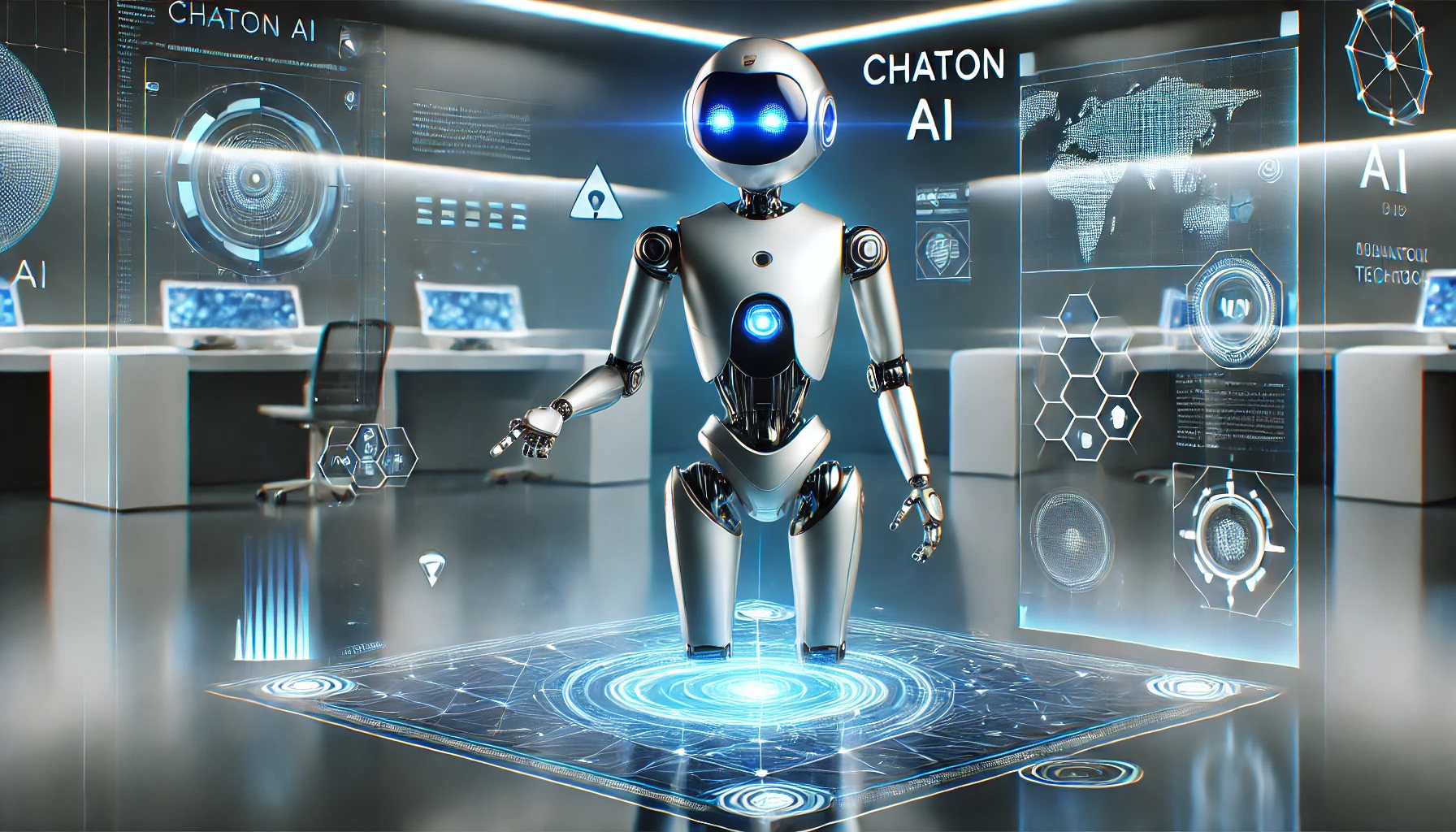Chaton AI (Chaton Artificial Intelligence)
Introduction to Chaton AI
Chaton AI is a state-of-the-art artificial intelligence system designed to revolutionize the way humans interact with technology. By leveraging advanced natural language processing (NLP) and machine learning algorithms, Chaton AI can understand, interpret, and respond to human language in a way that feels natural and intuitive. Whether used in customer service, personal assistance, or various professional domains, Chaton AI aims to provide a seamless conversational experience that enhances productivity and user satisfaction.
The development of Chaton AI represents a significant milestone in the field of artificial intelligence. Unlike traditional AI systems that rely on pre-programmed responses, Chaton AI employs sophisticated machine learning techniques to learn from vast amounts of data, continuously improving its understanding and performance. This adaptive learning capability allows one to handle a wide range of queries, from simple informational requests to complex problem-solving tasks.
In essence, Chaton AI is designed to bridge the gap between human communication and digital interaction. By mimicking human conversation patterns and understanding context, it provides a more engaging and effective way for users to interact with technology. This blog will delve into its history, core technologies, and key features that set it apart from other AI systems.
History and Development
The journey of Chaton AI began with the early experiments in artificial intelligence and natural language processing. The foundational research in these fields laid the groundwork for what would eventually become one of the most advanced conversational AI systems available today.
Early Beginnings
The origins of Chaton AI can be traced back to the 1950s and 1960s when pioneers like Alan Turing and Joseph Weizenbaum explored the possibilities of creating machines that could understand and generate human language. Turing’s famous test, which he proposed in his 1950 paper “Computing Machinery and Intelligence,” set the stage for future developments in AI. The Turing Test challenged machines to exhibit intelligent behavior indistinguishable from that of a human, a concept that continues to influence AI research to this day.
Weizenbaum’s creation of ELIZA, an early natural language processing computer program, demonstrated the potential for machines to engage in human-like conversations. Although ELIZA’s capabilities were limited to simple pattern matching, it sparked a wave of interest in developing more sophisticated conversational agents.
Advancements in NLP and Machine Learning
The next few decades saw significant advancements in both natural language processing and machine learning. Researchers developed more complex algorithms and models, enabling machines to better understand and generate human language. The introduction of neural networks and deep learning techniques in the 1980s and 1990s marked a turning point, allowing for more accurate and nuanced language processing.
Chaton AI’s development benefited greatly from these advancements. By leveraging cutting-edge machine learning algorithms and vast datasets, developers were able to create a system that could learn from real-world conversations and continuously improve its performance. The integration of neural networks allowed this to understand context, sentiment, and even subtleties like humor and sarcasm, making interactions feel more natural and human-like.
Modern Era and Commercialization
In the early 2000s, the commercial potential of conversational AI became evident. Companies began to explore how AI could be used to enhance customer service, automate routine tasks, and provide personalized experiences. It emerged as a leader in this space, offering a robust and versatile platform that could be customized for various applications.
Today, Chaton AI is used by businesses, educational institutions, healthcare providers, and individuals around the world. Its ability to understand and respond to complex queries has made it an invaluable tool in many domains, and its continuous learning capabilities ensure that it remains at the forefront of AI technology.
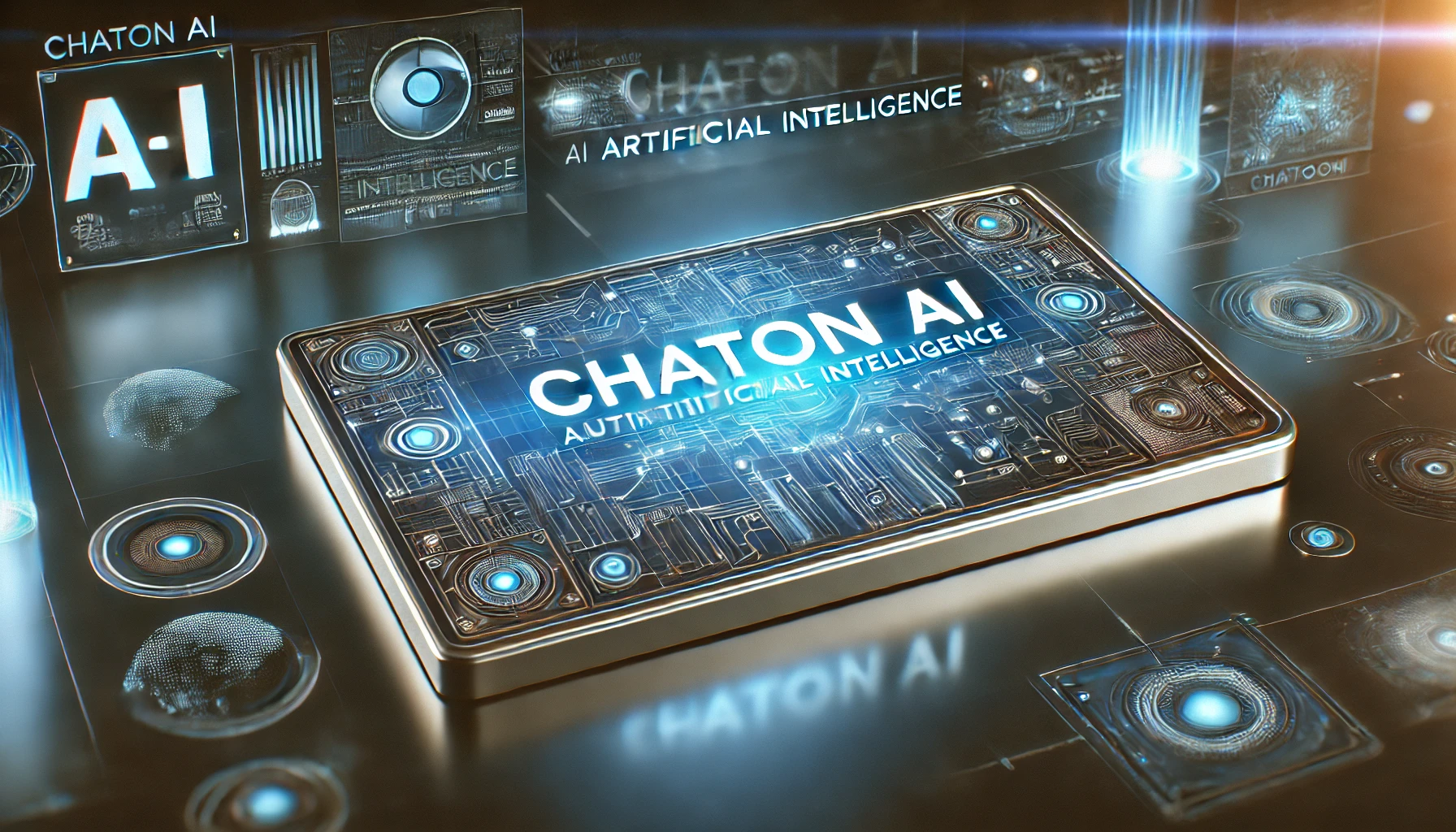
Core Technologies
Chaton AI’s impressive capabilities are built on a foundation of advanced technologies that work together to deliver a seamless conversational experience. Understanding these core technologies is key to appreciating the sophistication and potential of Chaton AI.
Text Preprocessing
The first step in NLP is text preprocessing, which involves cleaning and preparing the input data. This includes tasks such as tokenization, stemming, lemmatization, and removing stop words. Tokenization breaks down text into individual words or phrases while stemming and lemmatization reduce words to their root forms. Removing stop words, such as “and,” “the,” and “is,” helps to focus on the more meaningful parts of the text.
Part-of-speech tagging and Named Entity Recognition
Once the text is preprocessed, the next step is part-of-speech tagging and named entity recognition. Part-of-speech tagging assigns labels to words based on their grammatical role, such as nouns, verbs, adjectives, etc. Named entity recognition identifies and classifies entities in the text, such as names of people, organizations, locations, dates, and more. These steps help Chaton AI understand the structure and context of the text, enabling it to generate more accurate and relevant responses.
Semantic Analysis
Semantic analysis goes a step further by analyzing the meaning of the text. This involves understanding the relationships between words, phrases, and sentences, and interpreting the overall context and intent of the input. Techniques such as word embeddings and deep learning models like Transformers (e.g., BERT, GPT) are used to capture the semantic meaning of the text, allowing Chaton AI to generate responses that are contextually appropriate and coherent.
Machine Learning Algorithms
In addition to NLP, Chaton AI relies heavily on machine learning algorithms to enhance its capabilities. Machine learning is a subset of artificial intelligence that involves training models on large datasets to make predictions or decisions without being explicitly programmed.
Supervised Learning
Supervised learning is a common approach used in Chaton AI, where the model is trained on labeled data. This means that the input data is paired with the correct output, allowing the model to learn the relationships between them. For example, in a chatbot application, the model might be trained on a dataset of customer queries and their corresponding responses. By learning from these examples, the model can generate appropriate responses to new, unseen queries.
Reinforcement Learning
Reinforcement learning is another important technique used in Chaton AI. In this approach, the model learns by interacting with its environment and receiving feedback in the form of rewards or penalties. This is particularly useful for training conversational agents, as it allows the model to learn from real-time interactions and continuously improve its performance. For example, if the model provides a helpful response, it receives a positive reward, whereas an unhelpful response results in a penalty.
Key Features of Chaton AI
Chaton AI boasts a wide array of features that make it a powerful and versatile tool for various applications. These features are designed to enhance the user experience, improve productivity, and provide valuable insights.
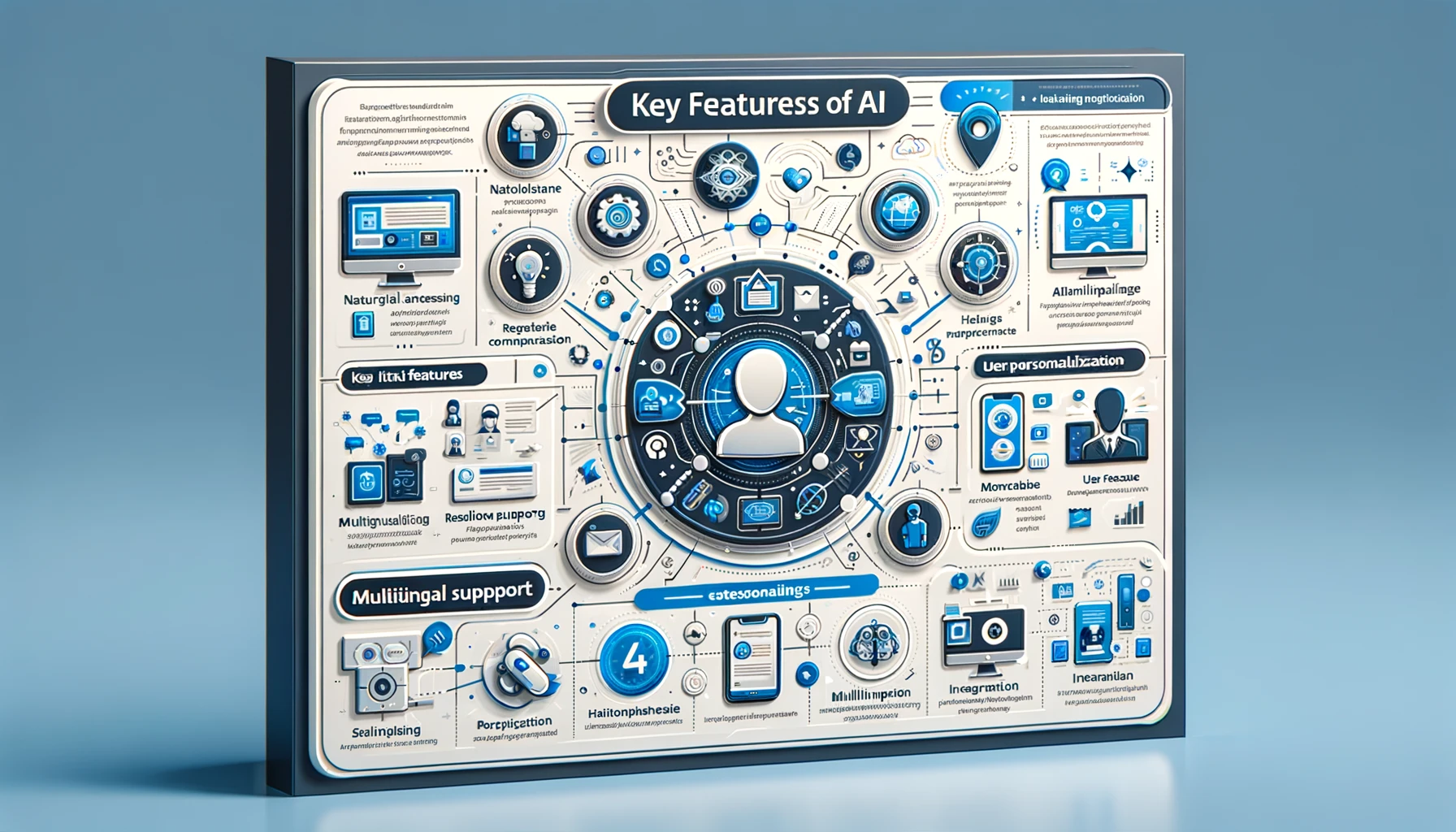
Natural Language Understanding
One of the standout features of Chaton AI is its ability to understand natural language. This goes beyond simple keyword matching and involves interpreting the meaning and intent behind user queries. By leveraging advanced NLP techniques, It can handle complex queries, understand context, and provide accurate and relevant responses.
Conversational Context
Chaton AI is capable of maintaining conversational context, which is essential for engaging and meaningful interactions. This means that the AI can remember previous interactions and use that information to inform its responses. For example, if a user asks a follow-up question, It also can refer back to the previous conversation and provide a coherent and contextually appropriate response.
Multilingual Support
In today’s globalized world, the ability to support multiple languages is crucial. Chaton AI is equipped with multilingual capabilities, allowing it to understand and generate responses in various languages. This makes it an ideal tool for businesses and organizations operating in diverse linguistic environments.
Personalization
Personalization is another key feature. By analyzing user data and preferences, it can tailor its responses to individual users. This not only enhances the user experience but also increases the effectiveness of the interaction. For example, a personalized recommendation from Chaton AI can be more relevant and appealing to the user, leading to higher engagement and satisfaction.
Integration with Other Systems
Chaton AI can be easily integrated with other systems and platforms, making it a versatile solution for various applications. Whether it’s integrating with customer relationship management (CRM) systems, enterprise resource planning (ERP) software, or other business tools, it can seamlessly interact with existing infrastructure to provide a unified and efficient solution.
Continuous Learning
One of the most impressive features of Chaton AI is its ability to learn continuously. By leveraging machine learning algorithms and real-time data, it can improve its performance over time. This means that the more it interacts with users, the better it becomes at understanding and responding to their queries. Continuous learning ensures that it remains up-to-date and relevant, providing users with the best possible experience.
Analytics and Insights
In addition to its conversational capabilities, Chaton AI also offers powerful analytics and insights. By analyzing interaction data, Chaton AI can provide valuable information on user behavior, preferences, and trends. This can help businesses make informed decisions, improve their services, and enhance customer satisfaction. For example, analyzing customer queries can reveal common pain points, allowing businesses to address them proactively.
Scalability and Reliability
Chaton AI is designed to be scalable and reliable, making it suitable for both small businesses and large enterprises. Its robust architecture ensures that it can handle a high volume of interactions without compromising performance. Whether it’s a few hundred queries or millions of interactions, Chaton AI can scale to meet the demand, providing a consistent and reliable experience.
Benefits of Using Chaton AI
Artificial Intelligence (AI) has become an integral part of modern technology, transforming the way businesses operate and interact with customers. Among the various AI tools available, Chaton AI stands out for its versatility and effectiveness. This blog explores the numerous benefits of using it, its applications in different industries, and how it integrates seamlessly with Google services to enhance productivity and customer satisfaction.
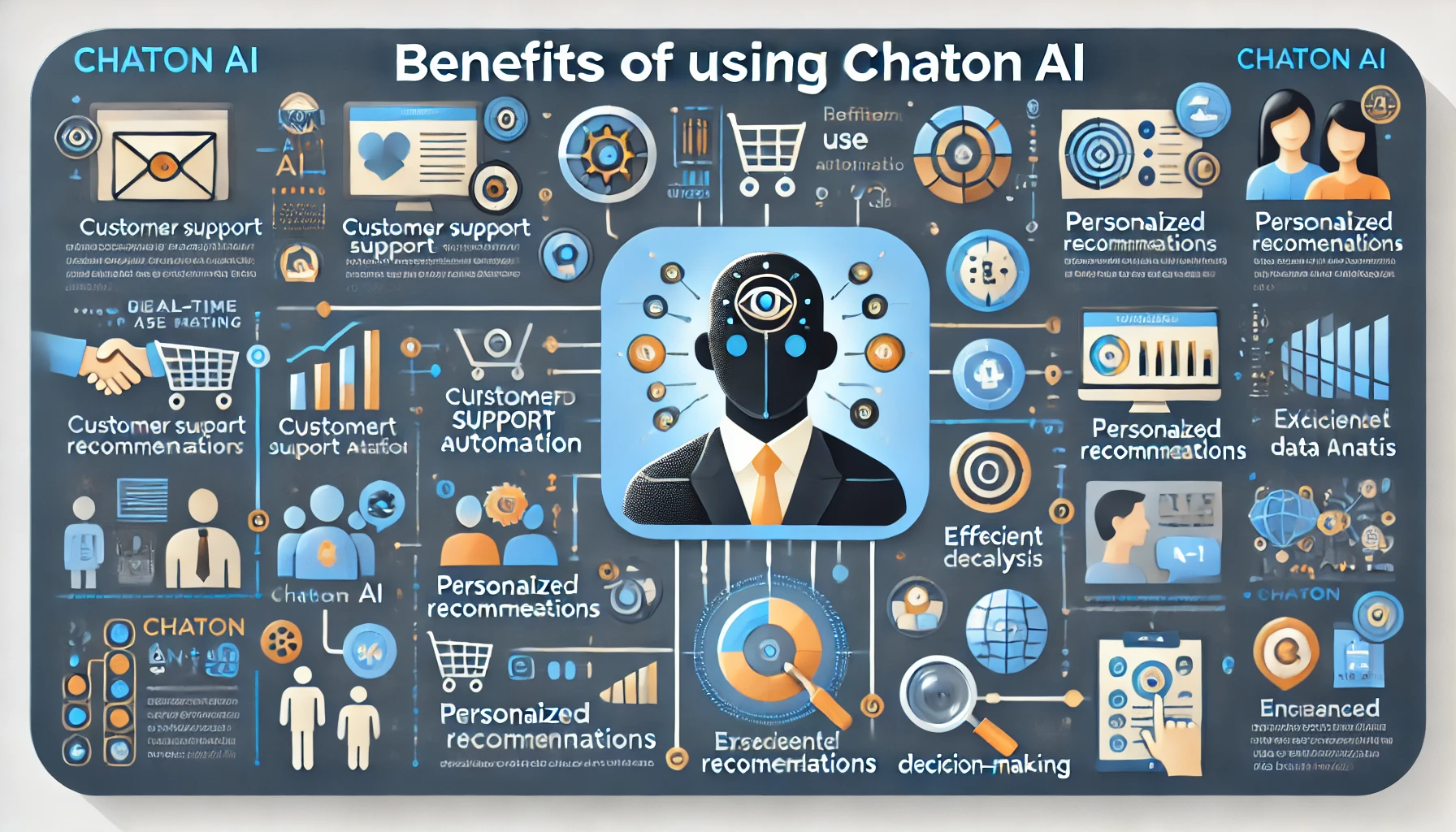
Improved Customer Service
They demand quick, efficient, and personalized service. Chaton AI addresses these needs by providing businesses with the tools to enhance their customer service operations. By leveraging natural language processing (NLP) and machine learning algorithms, it can understand and respond to customer queries in real-time, ensuring that customers receive accurate and helpful information promptly.
Chaton AI’s ability to handle multiple customer interactions simultaneously reduces wait times and ensures that no customer is left unattended. This not only improves customer satisfaction but also frees up human agents to focus on more complex issues, thereby increasing overall efficiency. Moreover, Chaton AI can learn from past interactions, continuously improving its responses and becoming more effective over time.
Efficiency and Productivity
Efficiency and productivity are critical factors for any business looking to stay competitive. Chaton AI helps businesses achieve these goals by automating routine tasks and streamlining operations. By handling repetitive and time-consuming tasks such as answering frequently asked questions, scheduling appointments, and processing orders, allows employees to focus on more strategic and value-added activities.
Additionally, its advanced analytics capabilities provide businesses with valuable insights into customer behavior and preferences. These insights can be used to optimize processes, improve product offerings, and tailor marketing strategies to better meet customer needs. By leveraging Chaton AI, businesses can achieve higher levels of efficiency and productivity, ultimately driving growth and profitability.
Applications of Chaton AI
Chaton AI’s versatility makes it suitable for a wide range of applications across various industries. This section explores some of the key areas where it is making a significant impact.
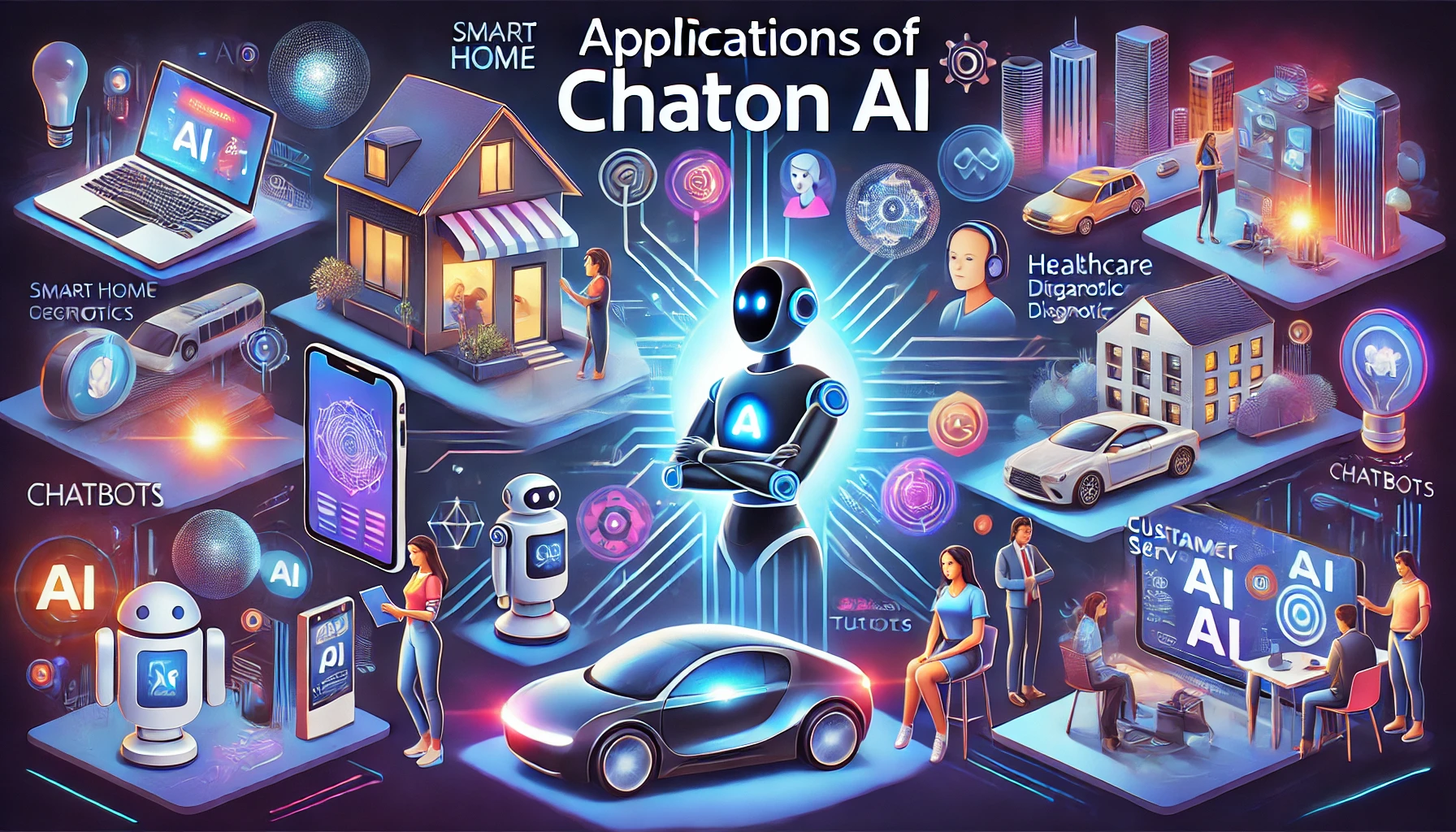
Customer Support
Customer support is one of the most common applications of Chaton AI. Businesses of all sizes are using Chaton AI to enhance their customer support operations, providing quick and accurate responses to customer queries. Chaton AI can handle a wide range of customer interactions, from answering simple questions to resolving complex issues. Its ability to operate 24/7 ensures that customers receive support whenever they need it, improving overall customer satisfaction.
Chaton AI can also be integrated with existing customer support systems, providing a seamless experience for both customers and support agents. By automating routine tasks, it frees up human agents to focus on more complex issues, improving efficiency and reducing operational costs.
Healthcare
The healthcare industry is another area where Chaton AI is making a significant impact. By leveraging AI technology, healthcare providers can enhance patient care, improve operational efficiency, and reduce costs. Chaton AI can be used to handle administrative tasks such as appointment scheduling, patient registration, and billing, freeing healthcare professionals to focus on patient care.
How Chaton AI Integrates with Google Services
Google Assistant
The integration of Chaton AI with Google Assistant has significantly transformed the e-commerce landscape. Google Assistant, a virtual assistant powered by artificial intelligence, provides users with a more personalized and efficient shopping experience. With Chaton AI, the capabilities of Google Assistant are enhanced, allowing it to understand and respond to user queries more effectively. This integration enables users to receive tailored product recommendations, get instant answers to their shopping-related questions, and even make purchases directly through voice commands.
The seamless interaction between Chaton AI and Google Assistant ensures that users can access a wide range of e-commerce services with ease. For instance, when a user asks Google Assistant about the best deals on a specific product, Chaton AI processes this query and provides accurate and up-to-date information. Additionally, Chaton AI can help users track their orders, check delivery statuses, and manage their shopping lists, making the entire shopping process more convenient and efficient.
Google Cloud Platform
The Google Cloud Platform (GCP) plays a crucial role in the integration of Chaton AI with e-commerce systems. By leveraging GCP’s powerful infrastructure, it can handle vast amounts of data and deliver real-time insights to e-commerce businesses. This integration enables companies to analyze customer behavior, predict trends, and optimize their inventory management.
One of the key benefits of using GCP in conjunction with Chaton AI is the ability to scale resources based on demand. During peak shopping seasons, e-commerce platforms often experience a surge in traffic, which can lead to performance issues. However, with GCP’s scalable infrastructure, businesses can ensure that their systems remain responsive and efficient, even during high-traffic periods. This ensures a smooth shopping experience for customers, ultimately leading to increased sales and customer satisfaction.
Moreover, the integration of Chaton AI with GCP allows e-commerce businesses to implement advanced machine learning algorithms for personalized marketing campaigns. By analyzing customer data, it can identify patterns and preferences, enabling businesses to deliver targeted advertisements and promotions. This not only enhances the shopping experience for customers but also helps businesses maximize their return on investment.
Challenges and Limitations of Chaton AI
Data Privacy Concerns
While the integration of Chaton AI with e-commerce platforms offers numerous benefits, it also raises significant data privacy concerns. The collection and analysis of vast amounts of customer data can potentially lead to breaches of privacy if not handled properly. E-commerce businesses must ensure that they comply with data protection regulations and implement robust security measures to safeguard customer information.
One of the primary concerns is the potential for unauthorized access to sensitive customer data. Cybersecurity threats are constantly evolving, and e-commerce platforms must stay vigilant to protect against data breaches. This includes implementing encryption, multi-factor authentication, and regular security audits to ensure that customer data remains secure.
Another aspect of data privacy is the issue of informed consent. Customers must be fully aware of how their data is being collected, used, and shared. E-commerce businesses should provide clear and transparent privacy policies, and give customers the option to opt out of data collection if they choose. By prioritizing data privacy, businesses can build trust with their customers and avoid potential legal and reputational repercussions.
Limitations in Understanding Context
Despite the advancements in artificial intelligence, Chaton AI still faces limitations in understanding context accurately. Natural language processing (NLP) is a complex field, and AI systems can sometimes misinterpret user queries, leading to incorrect or irrelevant responses. This can be particularly challenging in the e-commerce sector, where precise information is crucial for a satisfactory customer experience.
One of the main challenges is the ambiguity of human language. A single query can have multiple interpretations depending on the context, and AI systems may struggle to discern the intended meaning. For example, a customer asking for “apple” could be referring to the fruit, the tech company, or a specific product from Apple Inc. Without proper context, it might provide the wrong information, resulting in a poor user experience.
To address this limitation, continuous improvements in NLP algorithms and context awareness are necessary. This includes training AI models on diverse datasets and incorporating feedback mechanisms to learn from user interactions. Additionally, integrating Chaton AI with other contextual data sources, such as user browsing history and preferences, can help improve its understanding of context and deliver more accurate responses.
Future Prospects of Chaton AI
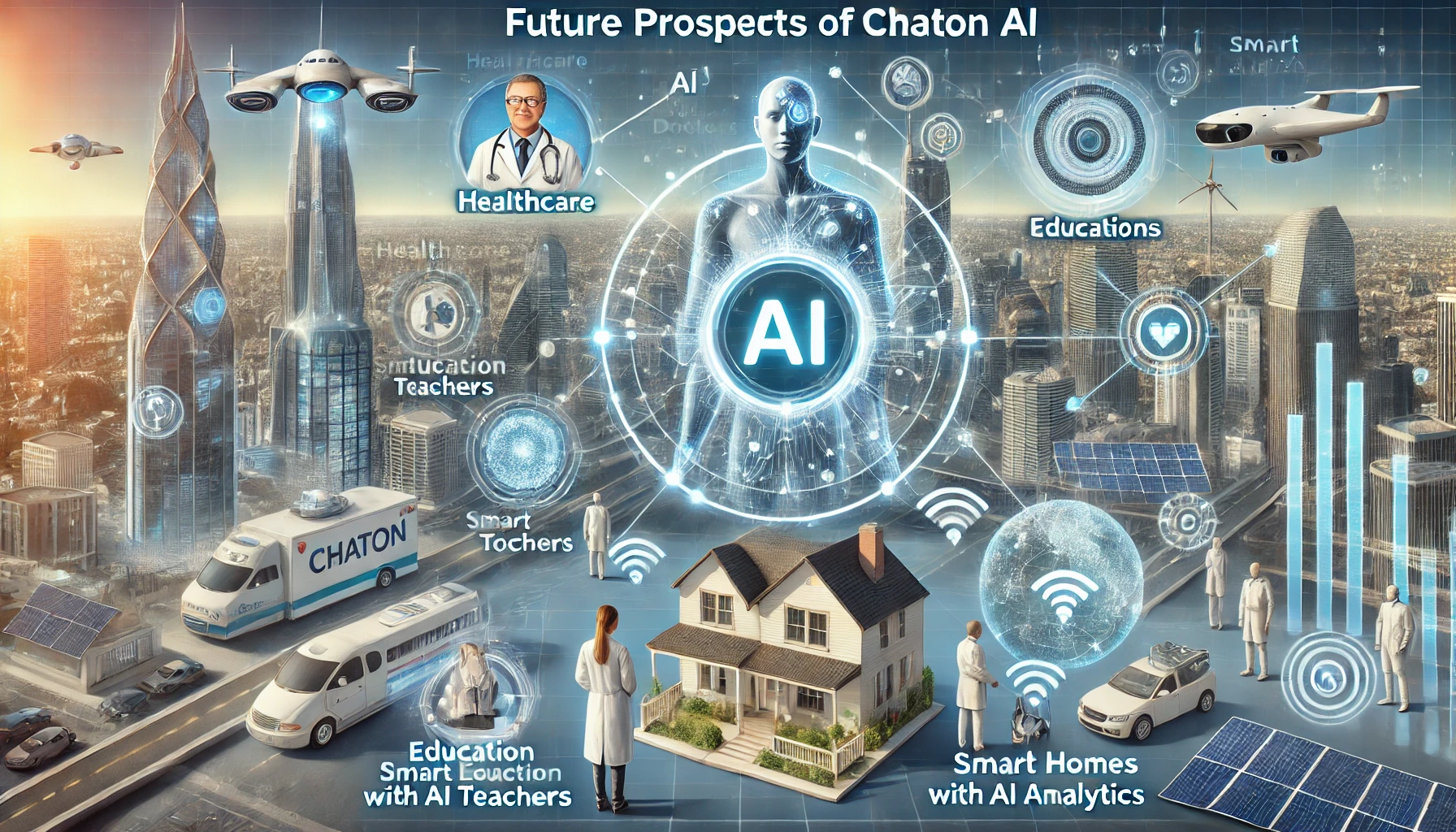
Artificial intelligence has been rapidly evolving, transforming industries and the way we interact with technology. Among the frontrunners of this revolution is Chaton AI, a state-of-the-art AI platform that promises to reshape various sectors through its advanced capabilities. As we delve into the prospects of Chaton AI, it is crucial to explore the emerging technologies fueling its growth, its potential impact on different industries, and how major players like Google are contributing to its development.
Natural Language Processing (NLP)
Natural Language Processing (NLP) is at the core of Chaton AI’s functionality. This technology enables machines to understand, interpret, and respond to human language in a way that is both meaningful and contextually relevant. Recent advancements in NLP have significantly improved the accuracy and fluency of AI-generated text, allowing Chaton AI to handle more complex and nuanced conversations. These improvements are driven by sophisticated algorithms and large datasets that help the AI learn and adapt to various linguistic patterns.
Machine Learning (ML)
Machine Learning (ML) is another critical component of Chaton AI. By leveraging ML algorithms, Chaton AI can continuously improve its performance by learning from past interactions. This self-improving capability is essential for maintaining high levels of accuracy and relevance in responses. As more data is processed, the AI becomes better at predicting user needs and providing more precise solutions.
Deep Learning
Deep Learning, a subset of machine learning, involves neural networks with many layers that can analyze vast amounts of data to identify patterns and make decisions. This technology is particularly effective in image and speech recognition, making Chaton AI more versatile in understanding and interacting with users. The integration of deep learning techniques allows us to perform complex tasks that were previously challenging for traditional AI systems.
Potential Impact on Various Industries
Healthcare
In the healthcare industry, Chaton AI has the potential to revolutionize patient care and administrative processes. By providing accurate and timely information, AI can assist in diagnosing conditions, recommending treatments, and managing patient records. For instance, Chaton AI can analyze medical data to identify trends and predict potential health issues before they become critical, enabling proactive healthcare management.
Finance
The financial sector stands to benefit significantly from Chaton AI’s capabilities. By analyzing transaction patterns and identifying anomalies, Chaton AI can help prevent fraudulent activities and ensure the security of financial transactions. Additionally, AI-driven chatbots can provide 24/7 customer support, answering queries and resolving issues more efficiently.
Education
The education sector can leverage Chaton AI to provide personalized learning experiences and administrative support. AI can analyze student performance and learning styles to tailor educational content, helping students achieve better outcomes. Additionally, it can assist educators with administrative tasks, such as grading and scheduling, allowing them to focus more on teaching.
Manufacturing
In manufacturing, Chaton AI can improve operational efficiency and product quality. AI can monitor production processes, predict maintenance needs, and optimize supply chain management. By analyzing data from various sources, it can identify potential issues before they cause disruptions, ensuring smooth and efficient manufacturing operations.
Frequently Asked Questions (FAQ)
Q1: What is Chaton AI?
Chaton AI is an advanced artificial intelligence platform designed to enhance various applications through its capabilities in natural language processing, machine learning, and deep learning. It can interact with users in a human-like manner, providing accurate and contextually relevant responses.
Q2: How does Chaton AI work?
Chaton AI utilizes a combination of NLP, ML, and deep learning algorithms to understand and process human language. It learns from past interactions and continuously improves its performance, making it more effective over time. Edge computing and blockchain technology further enhance its efficiency and security.
Q3: What are the main applications of Chaton AI?
Chaton AI can be applied across various industries, including healthcare, finance, retail, education, customer service, and manufacturing. It can assist in diagnosing medical conditions, detecting fraud, providing personalized recommendations, tailoring educational content, and optimizing manufacturing processes, among other applications.
Q4: Is Chaton AI secure?
Yes, Chaton AI incorporates advanced security measures, including blockchain technology, to ensure data integrity and protection. This is particularly important for industries that handle sensitive information, such as healthcare and finance.
Q5: Can Chaton AI operate in real-time?
Yes, Chaton AI’s integration with edge computing enables it to process data locally, reducing latency and ensuring faster response times. This makes it highly effective for real-time applications where speed and efficiency are critical.
Conclusion
The prospects of Chaton AI are promising, with emerging technologies driving its growth and potential impact across various industries. As AI continues to evolve, platforms like it will play a crucial role in enhancing efficiency, improving customer experiences, and enabling innovative solutions. With significant contributions from major players like Google, the development and deployment of AI technologies are set to transform the way we live and work. By addressing common questions and providing insights into the capabilities of Chaton AI, this blog aims to shed light on the exciting possibilities that lie ahead in the world of artificial intelligence.
